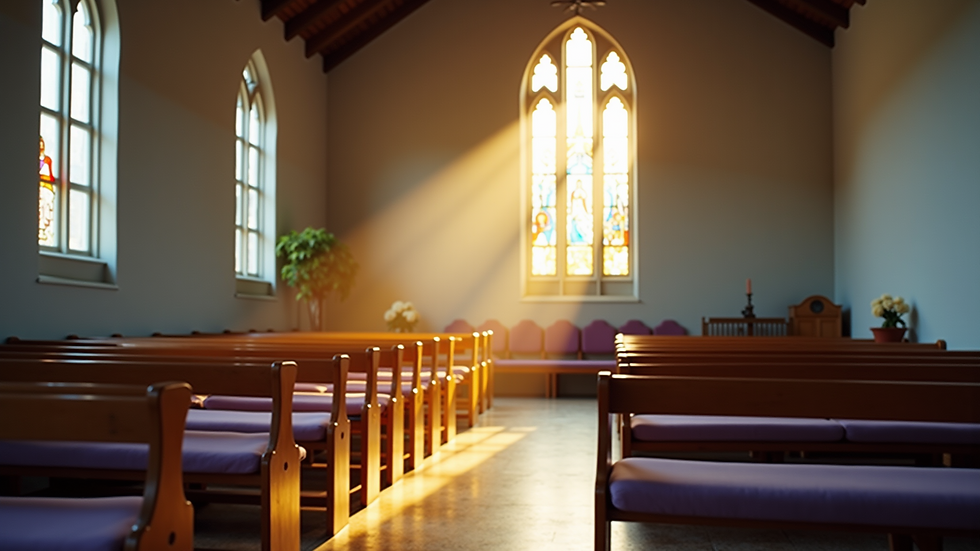Why does the sabbath make God’s Top Ten (The Ten Commandments)?
- B. Shawan Gillians
- Jun 22
- 6 min read
Updated: Jun 30

I need to say from the outset that I’m not going to dig into this subject the way I want to as that would be less blog post and more Bible study. But I’ll do my best with the highlights. With that said, here we go.
First, there are two sets of Ten Commandments. Okay, maybe that isn’t exactly accurate. But there are two versions of the Ten Commandments found in the Old Testament.
The first time we see the Ten Commandments is in Exodus 20:2-17. The scene is what many of us remember from television with Charlton Hester coming down from Mt. Sinai, stone tablets in hand. There we find at the fourth commandment the following
Remember the sabbath day, and keep it holy. Six days you shall labor and do all your work. But the seventh day is a sabbath to the LORD your God; you shall not do any work – you, your son or your daughter, your male or female slave, your livestock, or the alien resident in your towns. For in six days the LORD made heaven and earth, the sea, and all that is in them, but rested the seventh day; therefore the LORD blessed the sabbath day and consecrated it.
Exodus 20: 8-11 [NRSV]
The second time we see the Ten Commandments is in Deuteronomy 5:6-21. I suspect less people think of this giving of the Ten Commandments. Moses is giving his final very long goodbye – part sermon, part formation class – to the Israelites, as his disobedience to God’s instruction meant he wouldn’t be allowed into the Promised Land (again, maybe a topic for another post in the future). This time the commandment on the sabbath reads as follows
Observe the sabbath day and keep it holy, as the LORD your God commanded you. Six days you shall labor and do all your work. But the seventh day is a sabbath to the LORD your God; you shall not do any work – you, or your son or your daughter, or you male or female slave, or you ox or your donkey, or any of your livestock, or the resident alien in your towns, so that your male and female slave may rest as well as you. Remember that you were a slave in the land of Egypt, and the LORD your God brought you out from there with a mighty hand and an outstretched arm; therefore the LORD your God commanded you to keep the sabbath day.
Deuteronomy 5:6-21 [NRSV]
Overall, we see some meaningful similarities. In both versions God is not only concerned about rest for the Israelites, but also about rest for those who are ruled by the Israelites and don’t have the ability to control when they work. Specifically, children and slaves, who must do as they’re told, and farm animals. But God doesn’t stop there, there’s also rest for the resident alien (read here immigrants) who you might assume is not subject to the Ten Commandments, not being an Israelite. My big takeaway here? God is as concerned with our giving the sabbath to others as God is with our taking the sabbath ourselves. And not just to those we might deem worthy, like our children; or those from whom we derive a benefit by their refreshment like our slaves and beasts of burden; but also to the stranger within our gates, who may not look, speak, or even worship in the same way we do.
Also, in both versions the sabbath is the fourth commandment. A bridge, if you will, between the commandments that speak to our relationship with God and the commandments that speak to our relationship with fellow humans. It’s also the longest commandment, both in word count and the number of verses assigned to it. Both also note that the seventh day “is a sabbath to the Lord your God.”
I am sure there are many things each of us can learn in our personal study of the sabbath commandment, as in my opinion God is still speaking to us through scripture. On a side note, I encourage you to get a good study aid, or find a study group that works for you, or both, and dig in! But here are a few things that stand out for me.
I don’t think it’s happenstance that this commandment is the transition point between how we are taught to interact with God and how we are taught to interact with people. The sabbath is about both of these things! Having already discussed briefly the role of the sabbath in the relationship between people, let’s turn to the role of the sabbath in our relationship with God. Not to put too fine a point on it, but the commandment says the sabbath is to the Lord. I’ll go a half step farther and note that when the Israelites are still slaves in Egypt, Moses tells Pharoah to let the Israelites go not on a permanent basis or even for a day of rest, but so they may worship God.
With that kind of wind-up, it may surprise you to read that I don’t think observing the sabbath is just about going to church. I love church, and as an aspiring priest I spend a lot of time on church activities, but a careful reading of the commandment shows there is no mention of worship, only rest. So, if sabbath observance concerning our relationship with God isn’t only about going to your respective house of worship what else is there? And what does that mean for interpreting the exchange between Moses and Pharoah? Well, I think the answers to those questions will vary for each of us. Why? Because how we worship God is intimate and personal but doesn’t need to be formal. After all, “what does the LORD require of you but to do justice, and love kindness, and to walk humbly with your God?” Micah 6:8 [NRSV] For some that may mean acts of service or social justice, for some that may mean caring for God’s creation.
And if you can, go to church. I don’t think it’s an explicit requirement for salvation, but being in community with other believers can help encourage you on your walk with God.
But there are also some differences you might notice. The biggest may be that in Exodus the commandment is to remember the sabbath, while in Deuteronomy the commandment is to observe the sabbath. There is no doubt a biblical scholar somewhere who would cringe if they could read what I’m about to say, but chances are no biblical scholars are reading this blog, so we’re good!
I’d like to think that the difference we read between these two versions is a case of God custom fitting a word to the intended audience.
In Exodus God is speaking to a people who have just been freed from generations of slavery. While as a people they once knew what it was like to experience sabbath, they needed to be called to remember. Remember what they’d forgotten in the day-to-day drudgery. Because sometimes we don’t lose things suddenly – that would be obvious and noteworthy, and we would try to course correct. Sometimes we lose things slowly – bit by bit, and that is dangerous indeed.
The audience in Deuteronomy is about to walk into the promised land; a land flowing with milk and honey where agricultural pursuits will resume. The Hebrew word used here for observe evokes visions of caring in the way a gardener would tend to their garden. Perhaps what God is saying to the Israelites here is that while they’re going into a land that will give them many opportunities to thrive by caring for their crops, they will need to tend the sabbath in the same way to maintain a state of thriving.
So that’s it for this week, and thanks for bearing with me on such a long post. A few things for you to think about over the course of the upcoming week. What does worshipping God look like for you? What has slowly robbed you of your sabbath? How can you tend your sabbath garden?
And check back in with me next week when I consider if the sabbath is something Christians even need to worry about or if it’s an Old Testament tradition we can disregard like keeping kosher.
Go in peace to love and serve the Lord!




Comments